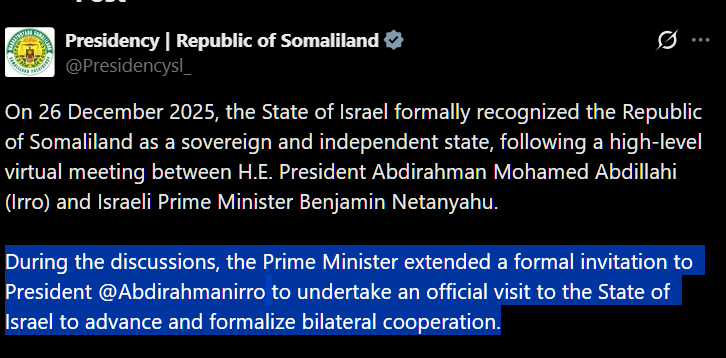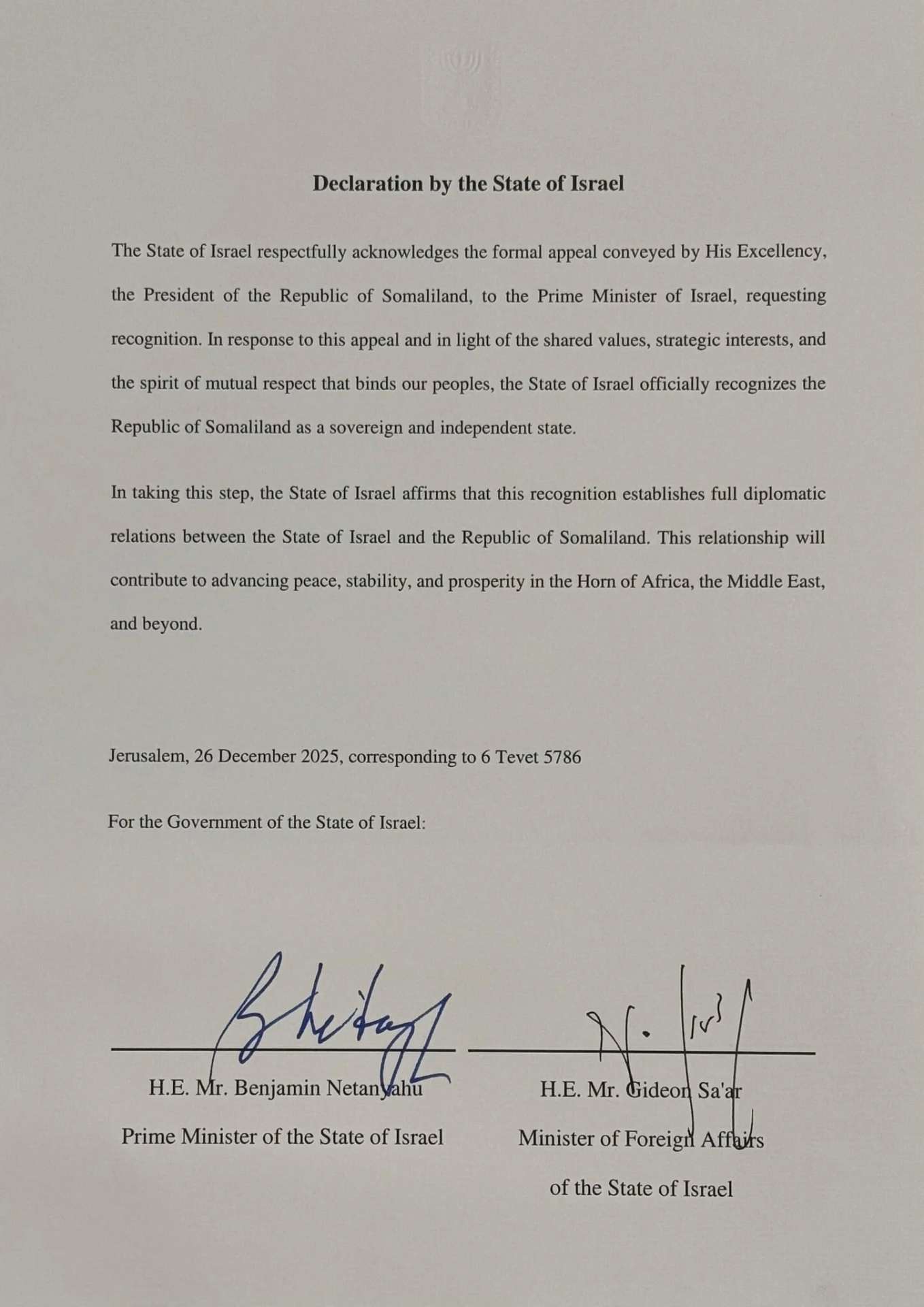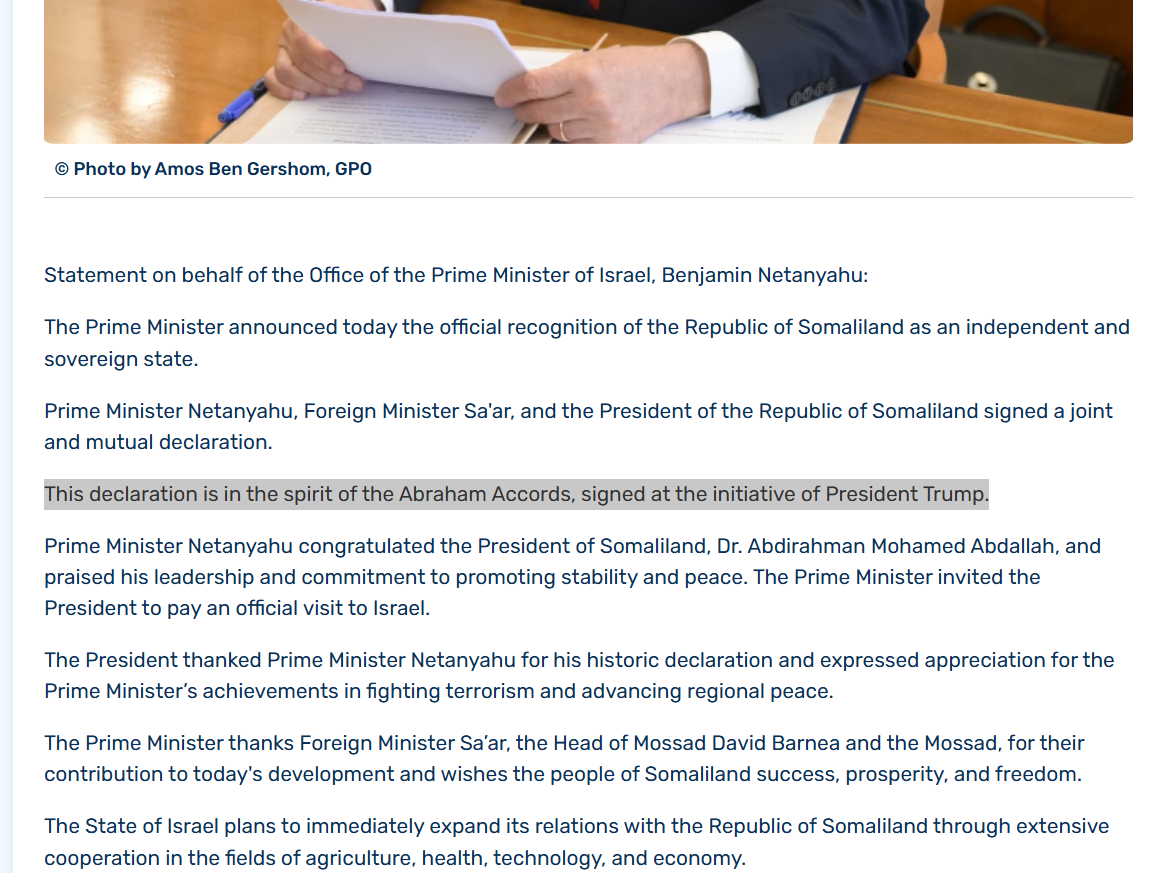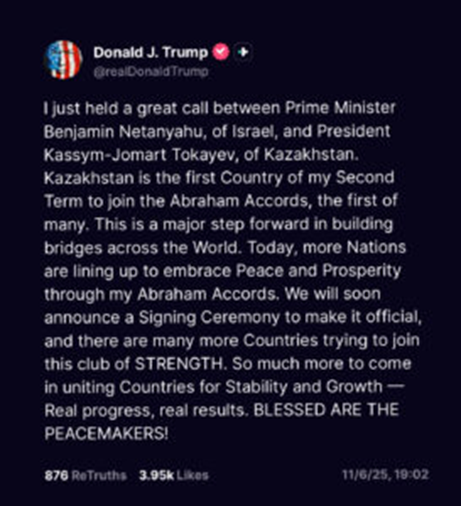Resolution Criteria
This market will resolve to "Yes" for any country that, by December 31, 2025, has publicly announced the formal normalization of diplomatic relations with Israel and/or signed a declaration or bilateral agreement with Israel as part of the Abraham Accords framework. This must be confirmed by official statements from the respective governments, the United States, or Israel, and reported by reputable international news sources (e.g., Reuters, Associated Press, BBC, The New York Times, The Wall Street Journal, or official government websites like the U.S. Department of State or the Israeli Ministry of Foreign Affairs). Countries that only express interest, enter into discussions, or sign non-binding declarations without full diplomatic normalization by the resolution date will resolve as "No".
Background
The Abraham Accords are a series of normalization agreements brokered by the United States, beginning in 2020. They established full diplomatic relations between Israel and several Arab and Muslim-majority nations. The initial signatories included Israel, the United Arab Emirates, and Bahrain. Morocco and Sudan subsequently joined, though Sudan's agreement remains unratified due to internal instability. The accords aim to foster peace, security, and economic cooperation in the Middle East.
Considerations
Several countries listed in the market's answers have been subjects of discussion regarding potential future normalization with Israel or expansion of the Abraham Accords:
Saudi Arabia: Despite serious interest in normalization, the Israel-Hamas war has led Saudi Arabia to insist on a viable path to an independent Palestinian state as a precondition for any agreement. Both the Biden and Trump administrations have actively sought to include Saudi Arabia in the accords.
Syria: Discussions about Syria joining the accords reportedly gained traction in 2025 following a change in government in December 2024. Both US and Israeli officials have suggested Syria as a potential member. However, significant obstacles remain, including the status of the Golan Heights and ongoing regional instability. Some Syrian officials have stated that tensions with Israel are distinct from those of other Arab states.
Lebanon: US and Israeli officials have also mentioned Lebanon as a potential candidate, particularly following a ceasefire and efforts to curb the influence of Hezbollah. However, Lebanese leaders have previously rejected normalization while Israeli forces remain in southern Lebanon.
Indonesia: As the world's most populous Muslim-majority country, Indonesia's inclusion would be significant. While the US has offered incentives, Indonesia maintains strong public support for the Palestinian cause and has stated it will not normalize relations until a comprehensive peace is achieved, intensified by recent conflicts.
Libya: Has been mentioned by US Special Envoy Steve Witkoff as a possible future partner in the Abraham Accords.
Azerbaijan: Is actively considered for inclusion in the expanded Abraham Accords and already maintains strong, long-standing ties with Israel, particularly in trade, energy, and defense. Progress on a peace process with Armenia is viewed as a key condition for its formal participation.
Armenia: Alongside Azerbaijan, Armenia has been identified by US Special Envoy Witkoff as a country potentially close to joining, contingent on resolving its conflict with Azerbaijan. While Armenia recognizes Israel, its relations have been strained due to Israel's arms supplies to Azerbaijan and Armenia's recognition of Palestine.
Kazakhstan: Has strong diplomatic and economic relations with Israel and is a significant oil supplier. It has been proposed as a candidate for the accords, with potential benefits including economic diversification and strengthened geopolitical positioning.
Qatar: Despite hosting US military bases, Qatar has consistently opposed normalization with Israel due to its strong support for Palestinian factions.
Oman: While there have been past diplomatic engagements with Israel, and mentions of regional economic integration, specific strong indications of Oman formally joining the Abraham Accords in 2025 are not prominent in recent reports, though it has been listed as a "plausible participant as an observer" in broader regional groupings.
Niger, Mali, Djibouti: These countries have been mentioned in the context of broader regional engagement and as potential observers in initiatives like the Negev Forum, but without strong indications of formal Abraham Accords membership in 2025.
Iran: Despite surprising suggestions from Donald Trump that Iran could potentially join the accords, Iranian officials have categorically rejected such a prospect, labeling the agreements "treacherous" and incompatible with their ideals.
Update 2025-11-07 (PST) (AI summary of creator comment): For Kazakhstan: The market will resolve to YES when an official signing ceremony takes place to formalize Kazakhstan's entry into the Abraham Accords, not merely upon announcement of intent. The creator has clarified that despite Kazakhstan already having full diplomatic relations with Israel, the formal signing ceremony is required for resolution.
🏅 Top traders
| # | Trader | Total profit |
|---|---|---|
| 1 | Ṁ214 | |
| 2 | Ṁ93 | |
| 3 | Ṁ44 | |
| 4 | Ṁ29 | |
| 5 | Ṁ25 |
People are also trading
@VonGadke I'm gonna let the Somaliland resolution stand since they've given a formal pledge, presumably binding, which falls into this market's requirements. The rest are pretty clearly NO. All done here
@Stralor Thanks for your quick resolution. This was a tough one. One could argue in favor of either YES or NO for Somaliland.
In this case I benefited from the resolution, but I feel @1bets argument was also valid. They were the only Somaliland NO holder, so I managrammed the 40M they bet. Thanks for defending your position in a polite and respectful way with clear and informative arguments.
It was a fun market! @VonGadke thanks for creating it. For future markets you may want to avoid ambiguous expressions such as “and/or”.
@VonGadke Please consider the unresolve - for Somaliland.
Like Kazakhstan, they have not actually joined the Abraham Accords yet.
Joining is a specific diplomatic process brokered by the United States that involves a formal US announcement, a symbolic signing ceremony (like the September 2020 White House event), and domestic ratification.
Since Somaliland has not completed these steps - specifically the ceremony and ratification - they cannot be considered to have joined.
Somaliland meets this:
publicly announced the formal normalization of diplomatic relations with Israel
For Kazahastan, Trump send a social media message mentioning a phone call with both countries (https://manifold.markets/VonGadke/what-countries-would-join-abraham-a#igbobbemv5i)
The media covered the announcement, but no PM signed anything.
For Somaliland we have an agreement signed by PM and Foreign Affairs Minister and the official channels of both governments published officially the start of diplomatic relations.
@VonGadke we probably need your input.
I read the resolution criteria "and/or" as allowing two possible paths for resolution. Either:
a country "publicly announced the formal normalization of diplomatic relations with Israel". This captures the case of countries without previous diplomatic relations with Israel, such as Somaliland.
a country "signed a declaration or bilateral agreement with Israel as part of the Abraham Accords framework". This captures the cases of countries with previous relations that go one step further formalizing into more detail an agreement as part of the Abraham Accords. This would be the case for Kazakhastan whenever they sign an Abraham Accords agreement between both countries.
In my understanding, either 1 OR 2 are sufficient for a YES.
I guess @1bets expect 1 AND 2. @1bets can clarify if my summary reflects properly our different positions.
In my view this official statement by the Prime Minister's Office meets the resolution criteria:
https://www.gov.il/en/pages/event-somaliland261225
Announcement by Presidency of Republic of Somaliland
https://x.com/Presidencysl_/status/2004562118121509326
Reuters:
Netanyahu, Foreign Minister Gideon Saar and Somaliland's president signed a joint declaration of mutual recognition
The Guardian:
The Israeli foreign minister, Gideon Sa’ar, announced on Friday that Israel and Somaliland had signed an agreement establishing full diplomatic relations, which would include the opening of embassies and the appointment of ambassadors.
Sa’ar said the recognition came after a year of talks between the two countries and that he had instructed Israel’s ministry of foreign affairs to immediately “institutionalise ties between the two countries”.
The full text signed by the mandatories was published by Times of Israel:
https://www.timesofisrael.com/israel-becomes-first-country-to-recognize-breakaway-somaliland-as-independent-state/
It includes "... this recognition stablish full diplomatic relations ..."

an official visit to the State of Israel to advance and formalize bilateral cooperation - had not happened yet.
No mention of Abraham Accords
@1bets
The visit will advance the details, but the document is already signed. Have a look:

@1bets
Abraham Accords are mentioned in the Israel official statement

@1bets I think the bit about normalizing relationship with Israel in the case of Israel is a bit of a technicality wrt Somaliland, as they had no previous relations to normalize.
@JussiVilleHeiskanen Like other Arab states that had not normalized relations with Israel, when they agreed to open embassies, establish diplomatic relations, and so on.
Many Arab states yet did not recognize Israeli passports
"We will soon announce a Signing Ceremony to make it official, and there are many more Countries trying to join this club of STRENGTH," Trump wrote on Truth Social.
...
Kazakhstan already has full diplomatic relations and economic ties with Israel, meaning the move would be largely symbolic, something Secretary of State Marco Rubio pushed back against on Thursday.
"It's an enhanced relationship beyond just diplomatic relations," he said.
"It is... with all the other countries that are part of the accord. You're now creating a partnership that brings special and unique economic development on all sorts of issues that they can work on together."
So not yet resolving as YES, but when they would sign it - will resolve it,
One week later, a phone call is what we have:
“Kazakhstan joins the Abraham Accords
During a meeting in the Oval Office, a joint phone conversation took place between the Presidents of Kazakhstan and the United States and Israeli Prime Minister Benjamin Netanyahu. The main topic was Kazakhstan’s intention to join the Abraham Accords.

And this is what we don’t have:
No official statements directly by Israel or Kazakhstan PMs
No evidence of activities towards preparation of the bilateral document. The last diplomatic activity reported by Israel embassy is from 2023. I would assume if they were hosting meetings to prepare the bilateral deal this would be relevant enough as to be reported
No date for signing ceremony
